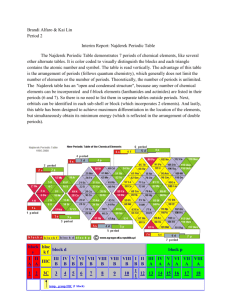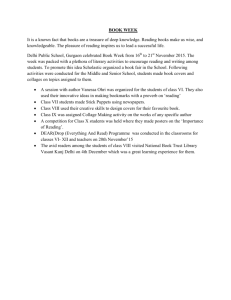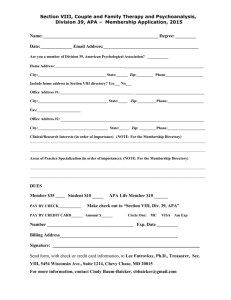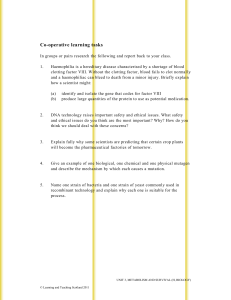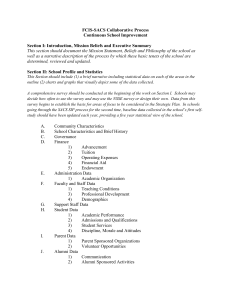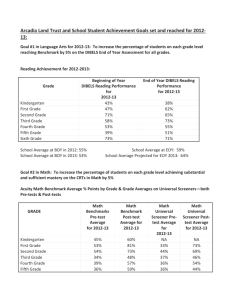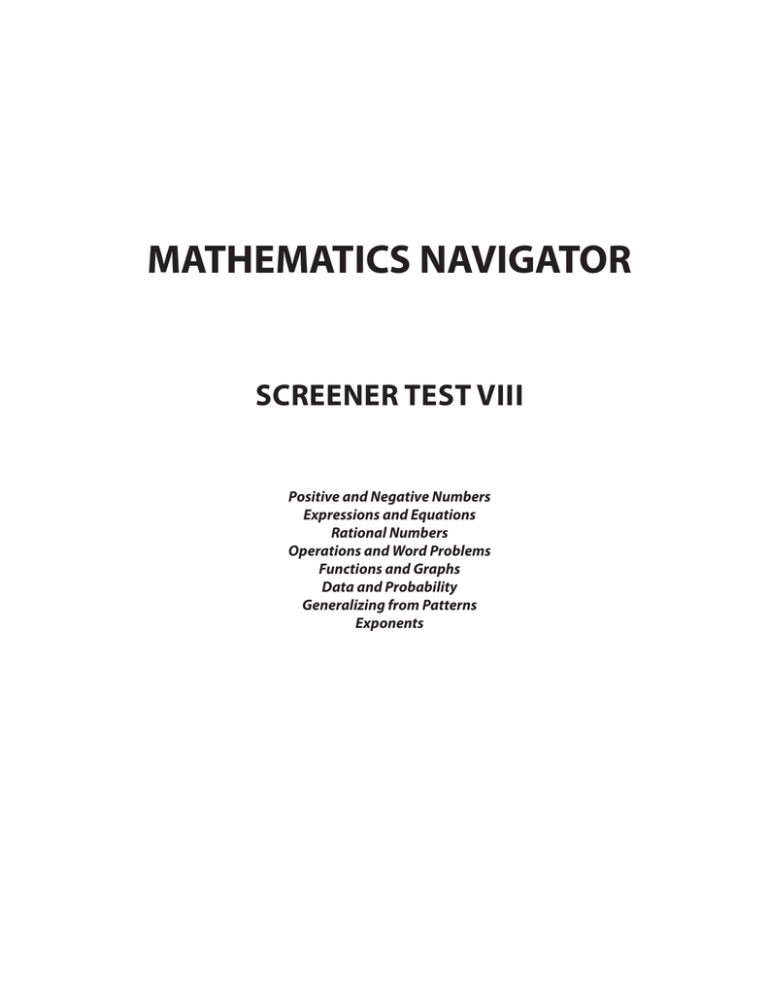
MATHEMATICS NAVIGATOR
Screener Test VIII
Positive and Negative Numbers
Expressions and Equations
Rational Numbers
Operations and Word Problems
Functions and Graphs
Data and Probability
Generalizing from Patterns
Exponents
This Screener Test has been designed to correlate with the NCTM Curriculum Focal Points.
Each Screener Test focuses on three to eight Mathematics Navigator modules, which in turn
focus on addressing misconceptions students may have about mathematics concepts.
Screener Test VIII is designed to be given at the beginning of the school year. It covers the
standards that students need in order to be successful at their grade level.
The results of this Screener Test will help instructors identify gaps in students’ knowledge and
determine which Mathematics Navigator modules will help fill those gaps. Participation in
these modules will help students succeed in mathematics and on their state assessments tests.
America’s Choice® is a subsidiary of the National Center on Education and the Economy® (NCEE), a Washington, DC-based
non-profit organization and a leader in standards-based reform. In the late 1990s, NCEE launched the America’s Choice School
Design, a comprehensive, standards-based, school-improvement program that serves students through partnerships with states,
school districts, and schools nationwide. In addition to the school design, America’s Choice provides instructional systems in
literacy, mathematics, and school leadership. Consulting services are available to help school leaders build strategies for raising
student performance on a large scale.
© 2009 by America’s Choice
All rights reserved. No part of this publication may be reproduced or transmitted in any form or by any means, electronic or
mechanical, including photocopy, recording, or any information storage and retrieval system without permission from the
America’s Choice permissions department.
America’s Choice and the America’s Choice logo are registered trademarks of America’s Choice. The National Center on
Education and the Economy is a registered trademark of The National Center on Education and the Economy.
First Printing 2009
1 2 3 4 5 6 7 8 9 10 12 11 10 09 08
ISBN 978-1-60637-608-9
http://www.americaschoice.org
e-mail: products@americaschoice.org
Screener Test VIII
1. Jin would like to buy a pair of jeans
and a T-shirt. The pair of jeans costs
$42 and the T-shirt costs $15. Jin
has $58.
Which expression will help Jin find
out if she has enough money to buy
both the jeans and the T-shirt?
A.
(42 + 15) − 58
B.
58 − (−42) − (−15)
C.
(−42) + 15 + 58
D.
58 − (42 + 15)
–––––––––––––––––––––––––––––––––––––––––
2. (–40) – [(–8) ÷ 4] = ___
A.
–38
B.
8
C.
–42
D.
–8
4. [(–1)(–1)(–1)] – [3(–1)] = ___
A.
–4
B.
–3
C.
0
D.
2
–––––––––––––––––––––––––––––––––––––––––
5. Which two expressions
are equivalent?
A.
–8(4 – 2x) and (–32) – 2x
B.
–(–32) – 8x and –2(16 – 8x)
C.
–2[(–8x) + 16] and (–32) + 16x
D.
2(8x – 16) and 2(16 – 8x)
–––––––––––––––––––––––––––––––––––––––––
3. Simplify.
(–5) – 6 + (–8) = ___
A.
–3
B.
–19
C.
–9
D.
–7
➥
GO ON
©America’s Choice
Mathematics Navigator
|
Screener Test VIII
6. If this table represents the equation
y = ax + c, what are the values of
a and c?
x
–1
0
1
2
y
2
4
6
8
8. On holidays, Carla gets paid 50
percent more than her regular hourly
rate for working at the ice cream store.
Last week she made $196 for working
16 regular hours and 8 holiday hours.
If x represents Carla’s regular hourly
rate, which equation could be used to
calculate x?
A.
a = 4, c = 2
B.
a = 2, c = 4
A.
1.5x = 196
C.
a = –2, c = –4
B.
16x + 8(x + 50) = 196
D.
a = 2, c = –4
C.
16x + 8(1.5x) = 196
D.
16x + 8(1 + x) = 196
–––––––––––––––––––––––––––––––––––––––––
7. When Mario sells an item in the shop
where he works, he earns one-quarter
of the price of the item plus 25 cents.
If he sells a statue for $12.40, how
much does he earn?
–––––––––––––––––––––––––––––––––––––––––
9. Solve for x.
2x + 1
=5
3
A.
$3.10
A.
x = 16
B.
$3.25
B.
x=8
C.
$12.65
C.
x = 32
D.
$3.35
D.
x=7
➥
GO ON
|
Screener Test VIII
©America’s Choice
Screener Test VIII
10. Is this equation always true, never
true, sometimes true, or you can’t tell?
12.
14
÷7=
9
x+4=y+4
A.
Always true
B.
Never true
C.
Sometimes true
D.
Can’t tell
A.
9
2
B.
9
98
C.
98
9
D.
2
9
–––––––––––––––––––––––––––––––––––––––––
11.
1
3
1
+ –
=
3
4 2
–––––––––––––––––––––––––––––––––––––––––
A.
1
4
B.
19
12
C.
3
5
D.
7
12
3
13. A jug contains liter of water. Amir
4
1
drinks liter.
5
How much water is left in the jug?
A.
1
liter
10
B.
11
liter
20
C.
4
liter
9
D.
7
liter
20
➥
GO ON
©America’s Choice
Mathematics Navigator
|
Screener Test VIII
14. Which fraction has the same value
8
as
?
20
A.
8+4
20 + 4
B.
8 4
20 4
C.
8 4
20 4
D.
Both B and C
16. Water flows from a sprinkler at a rate
of 2.5 gallons per minute. How much
water will flow in 3 hours?
A.
450 gallons
B.
7.5 gallons
C.
50 gallons
D.
360 gallons
–––––––––––––––––––––––––––––––––––––––––
2
of her team’s 56 points
7
in a quiz contest. How many points
did she score?
17. Lena scored
–––––––––––––––––––––––––––––––––––––––––
15.
6
5
3
×2 ÷ =
7
6
7
A.
2
7
10
B.
3
17
18
C.
5
2
3
D.
4
18
49
A.
12
B.
16
C.
196
D.
56
2
7
➥
GO ON
|
Screener Test VIII
©America’s Choice
Screener Test VIII
18. The price of gold is proportional to
its weight.
2
ounce
5
3
ounce
5
$200
$300
ounce(s)
$500
19. Which calculation gives the correct
answer to the following problem?
A pound of cheese costs $4.50. Ms.
Luna buys a package of cheese that
weighs 0.25 pounds. How much does
she pay for the cheese?
A.
4.50 × 0.25
B.
4.50 ÷ 0.25
C.
4.50 + 0.25
D.
4.50 – 0.25
What is the missing weight?
–––––––––––––––––––––––––––––––––––––––––
20. Jong worked in a cafeteria for 20
hours. He earned $170.40. How much
was he paid for each hour of work?
A.
9
ounce
25
B.
4
ounce
25
C.
1 ounce
A.
$8.02
D.
4
ounce
5
B.
$8.52
C.
$80.52
D.
$3,408.00
➥
GO ON
©America’s Choice
Mathematics Navigator
|
Screener Test VIII
21. Which graph represents the linear relationship shown in this table?
x
–1
0
1
2
3
y
–1
1
3
5
7
y
A.
y
5
4
3
2
1
x
–5 –4 –3 –2 –1
–2
–3
–4
–5
1 2 3 4 5
B.
5
4
3
2
1
–5 –4 –3 –2 –1
–2
–3
–4
–5
y
2
1
–5 –4 –3 –2 –1
–2
–3
–4
–5
1 2 3
5
y
5
4
C.
x
x
2 3 4 5
5
4
3
2
1
D.
–5 –4 –3 –2
x
1 2 3 4 5
–2
–3
–4
–5
➥
GO ON
|
Screener Test VIII
©America’s Choice
Screener Test VIII
22. Which rule does this line graph represent?
y
6
A.
“Subtract 2 times x from 4.”
B.
“Subtract x from –4.”
C.
“Subtract x from 4.”
D.
“Add 4 to x.”
4
3
2
1
–2 –1
–2
x
1 2 3 4
6
–––––––––––––––––––––––––––––––––––––––––––––––––––––––––––––––––––––––––––––––––––––
23. Sylvia runs at a rate of 6 meters per second.
d is the distance in meters that Sylvia has run after n seconds.
What is the correct rule for d?
A.
d=n+6
B.
d=6
C.
d=
D.
d = 6n
n
6
➥
GO ON
©America’s Choice
Mathematics Navigator
|
Screener Test VIII
24. Which equation does this line graph represent?
26. The school dance band conducted
a random survey of 250 seniors to
determine what song to play on prom
night for the first dance. The survey
results are shown in this table.
y
6
5
4
3
1
–2 –1
–2
x
1 2 3 4 5 6
A.
y=3
B.
y = 3 + 3x
C.
y=3+x
D.
y=x
10
$205
25
$505
Number of
Students
I Believe I Can Fly
163
We Are the Champions
54
School Is Out
28
One in a Million
5
There are 1,200 seniors in the school.
Based on the survey results, how
many seniors would be expected
to choose One in a Million as their
favorite song?
–––––––––––––––––––––––––––––––––––––––––
25. This table shows how the cost, c,
of concert tickets purchased on the
internet is a function of the number of
tickets, t, bought.
t
c
Song
50
$1,005
A.
5
B.
2
C.
24
D.
240
100
$2,005
Which equation describes the
relationship in the table?
A.
c = 20t
B.
c = 10t + 5
C.
c = 20t + 5
D.
c = 10t + 205
➥
GO ON
|
Screener Test VIII
©America’s Choice
Screener Test VIII
Number of Students
27. This is a histogram of the measured
heights of students in Mr. Samson’s
science class.
28. This box plot shows the weights of
200 chickens.
Weights of Chickens (pounds)
12
10
8
6
0
4
2
0
150–
154
155–
159
160–
164
165–
169
170–
174
175–
179
Height (cm)
Which value is the best estimate of the
median for this data?
A.
162 cm
B.
155 cm
C.
160 cm
D.
157 cm
0.5
1.0
1.5
2.0
2.5
3.0
What is the range of the weights of
the chickens?
A.
2
B.
3
C.
1.5
D.
2.5
–––––––––––––––––––––––––––––––––––––––––
29. A math class took a test. The 15 girls in
the class had a mean score of 90, and
the 10 boys in the class had a mean
score of 85. What is the mean score for
the whole class?
A.
90
B.
88
C.
87.5
D.
85
➥
GO ON
©America’s Choice
Mathematics Navigator
|
Screener Test VIII
30. Mike recorded the amount of time it took 200 people to solve a Sudoku puzzle. The
results are shown below.
Male
Female
Solved in less than 5 minutes
15
20
Solved in 5–10 minutes
35
25
Solved in more than 10 minutes 30
35
20
20
Did not solve
Based on these survey results, what is the probability that a female will solve a puzzle in
less than 5 minutes?
A.
20
200
B.
5.0
C.
0.8
D.
20
100
–––––––––––––––––––––––––––––––––––––––––––––––––––––––––––––––––––––––––––––––––––––
31. What is the 10th number in this sequence?
2,
A.
52
B.
101
C.
37
D.
122
5,
10,
17,
26,
…
➥
GO ON
10
|
Screener Test VIII
©America’s Choice
Screener Test VIII
32. Use the graphs below to answer this problem.
Graph B
Value
Value
Graph A
1
2
3 4
Term
1
5
3 4
Term
5
Value
Graph D
Value
Graph C
2
1
2
3 4
Term
5
1
2
3 4
Term
5
Which graph best represents this sequence?
6, 9, 12, 15, 18, …
A.
Graph A
B.
Graph B
C.
Graph C
D.
Graph D
–––––––––––––––––––––––––––––––––––––––––––––––––––––––––––––––––––––––––––––––––––––
33. Find the next terms for this sequence.
3, 10, 17, 24, …
A.
32, 40, 48
B.
31, 37, 42
C.
48, 82, 164
D.
31, 38, 45
➥
GO ON
©America’s Choice
Mathematics Navigator
|
11
Screener Test VIII
34. Which expression matches this sequence?
3, 5, 7, 9, …
n represents the position of a term in the sequence.
A.
n
B.
2n + 1
C.
3n
D.
n+2
–––––––––––––––––––––––––––––––––––––––––––––––––––––––––––––––––––––––––––––––––––––
35. Jin walks at a speed of 2 meters per second. Which graph shows her walking at a
constant speed of 2 meters per second?
B.
Distance (meters)
y
10
8
6
4
2
x
0
0
1
2
3
4
5
6
y
Distance (meters)
A.
10
8
6
4
2
x
0
7
0
1
Time (seconds)
D.
Distance (meters)
y
10
8
6
4
2
x
0
0
1
2
3
4
5
6
Time (seconds)
3
4
5
6
7
Time (seconds)
7
y
Distance (meters)
C.
2
10
8
6
4
2
x
0
0
1
2
3
4
5
6
7
Time (seconds)
➥
GO ON
12
|
Screener Test VIII
©America’s Choice
Screener Test VIII
36. What is the value of y in the equation
y = 5x – 2x when x = 3?
39. The radius of Jupiter is 69,075 km.
Express that radius in scientific
notation.
A.
133
B.
27
A.
69.075 × 103 km
C.
117
B.
6.9075 × 10–4 km
D.
9
C.
6.9075 × 104 km
D.
6.9075 × 10–3 km
–––––––––––––––––––––––––––––––––––––––––
37. Which expression is equal to
(3.6 • 10–7) ÷ 106?
92
3
A.
3.6 • 101
B.
3.6 • 10–13
C.
D.
–––––––––––––––––––––––––––––––––––––––––
40. Simplify this expression.
13
3.6 • (–10 )
–1
3.6 • 10
A.
27
B.
9
C.
6
D.
18
–––––––––––––––––––––––––––––––––––––––––
38. Simplify this expression.
3 –7
3 • 2
3
9
A.
1
B.
3
C.
34
D.
3–31.5
STOP!
©America’s Choice
Mathematics Navigator
|
13
Screener Test VIII Answer Key
Question Answer
Number
Key
Content Description
Unit
D
Applies properties of arithmetic and considers
negative numbers in everyday contexts to select
an expression that could be used to solve a
word problem
A
Extends an understanding of addition, subtraction,
multiplication, and division and related number
properties to all rational numbers, including negative
integers, to solve a multistep problem
B
Extends an understanding of addition, subtraction,
multiplication, and division and related number
properties to all rational numbers, including negative
integers, to simplify numeric expressions involving
negative numbers
D
Extends an understanding of addition, subtraction,
multiplication, and division and related number
properties to all rational numbers, including negative
integers, to solve a multistep problem
5
C
Extends an understanding of addition, subtraction,
and related number properties to all rational
numbers, including negative integers, to simplify and
identify equivalent linear equations in one variable
6
B
Describes simple relationships by substituting the
values from a table into an equation to determine the
values of unknown variables
7
D
Uses knowledge of the arithmetic of fractions and
decimals to solve a multistep word problem
C
Understands that variables represent numbers whose
exact values are not yet specified and uses knowledge
of the arithmetic of rational numbers to write an
equation that represents a word problem
9
D
Understands that variables represent numbers whose
exact values are not yet specified and uses knowledge
of the arithmetic of rational numbers to solve linear
equations in one variable
10
C
Uses the commutative, associative, and distributive
properties to determine whether an equation is
always true, never true, or sometimes true
1
2
3
4
8
©America’s Choice
Positive and
Negative
Numbers
Expressions
and Equations
Mathematics Navigator
|
15
Screener Test VIII Answer Key
Question Answer
Number
Key
Content Description
D
Applies an understanding of fractions and
fraction models to add and subtract fractions
with unlike denominators
D
Uses a knowledge of the rules for dividing fractions to
select the appropriate method to divide a fraction by a
whole number
13
B
Applies an understanding of fractions and
fraction models to add and subtract fractions with
unlike denominators in the context of a word problem
14
D
Uses a knowledge of the meanings of fractions and
properties of operations to find equivalent fractions
15
C
Uses a knowledge of the rules for multiplying and
dividing fractions to solve a two-step problem
16
A
Uses simple reasoning about multiplication and
division to solve multistep word problems involving
ratio and rate
17
B
Builds on a knowledge of fractions to solve a word
problem that involves finding the fractional part of
a whole
18
C
Analyzes a table that indicates relative ratios and
rates of quantities to solve a multistep word problem
A
Uses simple reasoning about multiplication and
division to determine an expression that could be
used to solve a word problem
20
B
Uses simple reasoning about multiplication and
division to solve one-step word problems involving
ratio and rate
21
D
Translates between tabular and graphical
representations of functions to identify a graph
that represents data in a table
22
C
Translates among verbal, graphical, and algebraic
representations of functions in order to identify a
formula that represents a line graph
23
D
Uses knowledge of linear equations to find a rule for a
word problem involving distance and time
24
C
Uses knowledge of linear equations and their graphs
to identify a formula that represents a line graph
11
12
19
16
|
Screener Test VIII
Unit
Rational
Numbers
Operations and
Word Problems
Functions
and Graphs
(continues)
©America’s Choice
Screener Test VIII Answer Key
Question Answer
Number
Key
Content Description
Unit
25
C
Translates between tabular and algebraic
representations of functions to identify an equation
that represents data in a table
26
C
Applies an understanding of proportions to make
predictions based on data in a table
A
Uses descriptive statistics, including mean,
median, and range, to describe data represented
in a histogram
28
A
Uses descriptive statistics, including mean,
median, and range, to describe data represented
in a box and whisker plot
29
B
Uses descriptive statistics, including mean, median,
and range, to solve a word problem
30
D
Applies an understanding of the concept that when
all outcomes of an experiment are equally likely,
the theoretical probability of an event is the fraction
of outcomes in which the event occurs to find a
probability based on data in a table
31
B
Analyzes nonlinear sequences represented as patterns
and numerically in order to extend a nonlinear
sequence to any term
32
C
Analyzes linear sequences to find a graph that
represents a sequence
33
D
Analyzes linear sequences to find the next three terms
of a sequence
34
B
Analyzes nonlinear sequences to identify an
expression that matches a sequence
35
A
Applies ideas about linear functions to identify a
graph that represents constant speed
36
C
Uses knowledge of the rules of exponents to solve an
equation in two variables and in which the exponents
are variables
37
B
Uses knowledge of the rules of exponents and
scientific notation to find equivalent expressions
38
A
Uses knowledge of the rules of exponents, including
exponents within fractions and negative exponents, to
simplify an expression
27
©America’s Choice
Functions
and Graphs
(continued)
Data and
Probability
Generalizing
from Patterns
Exponents
(continues)
Mathematics Navigator
|
17
Screener Test VIII Answer Key
Question Answer
Number
Key
Content Description
39
C
Uses knowledge of the rules of exponents and
scientific notation to solve a word problem and
represent the solution in scientific notation
40
A
Uses knowledge of the rules of exponents, including
exponents within fractions, to simplify an expression
18
|
Screener Test VIII
Unit
Exponents
(continued)
©America’s Choice

